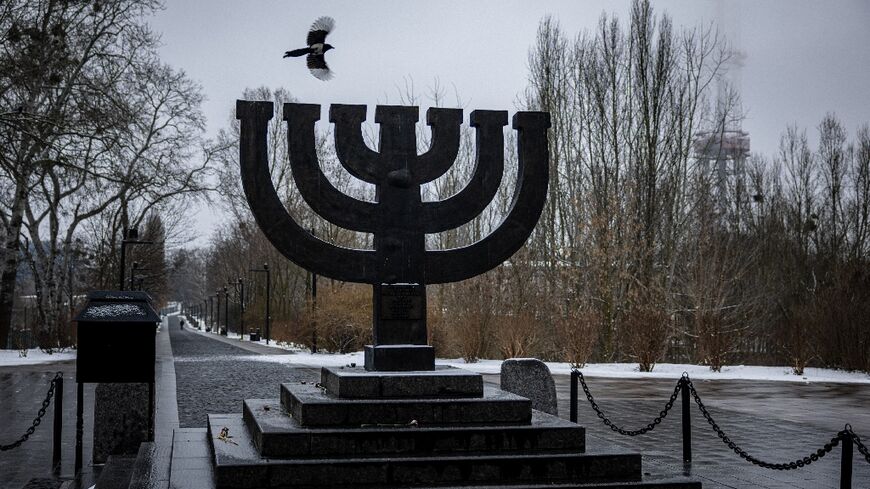Zelensky invokes Judaism to rally support for Ukrainian cause

With online posts in Hebrew and appeals to Jews to "cry out" in response to Russia's invasion, Ukrainian President Volodymyr Zelensky has invoked his faith to rally support for his embattled country.
The 44-year-old comedian-turned-president previously told the Times of Israel that he had an "ordinary... Jewish upbringing", explaining "most Jewish families in the Soviet Union were not religious".
But since Russia's invasion was unleashed on February 24, Zelensky has made explicit reference to Judaism in stirring social media posts seeking to build global backing for Ukraine.
On Wednesday, a day after a Russian attack on Kyiv's television mast beside Babi Yar -- the site of a World War II Nazi massacre in which over 30,000 of the city's Jews were shot dead -- Zelensky reacted with outrage.
"I call now on all the Jews of the world -- do you not see what is happening here? This is why it's important for millions of Jews around the world not to stay silent in the face of such sights. Because Nazism was born in silence," he wrote in Hebrew on the Telegram messenger service.
The following day, Zelensky, who has visited Israel many times and said he has family in the Jewish state, reached out again to Jews.
The embattled president told a news conference he was grateful for "a beautiful picture of people wrapped in the Ukraine flag at the Western Wall" -- in Jerusalem that is considered the holiest site where Jews can pray.
Zelensky added, however, that he did not feel "that the Israeli government had wrapped itself with the Ukranian flag".
- 'Unique role' -
Zelensky's comments appeared a clear attempt to broaden support for Ukraine among Jews and especially within Israel, where Prime Minister Naftali Bennett has avoided any forceful condemnation of Russia, seeking to preserve delicate security ties with Moscow.
But his public referencing of his Judaism amid an unprecedented crisis is not just a tactic to rally Jewish goodwill, according to experts and a prominent Soviet-era dissident who knows the Ukranian president personally.
Zelensky's "Jewishness is important for him", said Nathan Sharansky, who spent years in a Soviet Gulag accused of treason for seeking permission to move to Israel.
"He is not a Jew who is making a secret of his Jewishness and he is not a Jew who is looking for some other identity," Sharansky told AFP.
Sharansky was born in Ukraine and helped spark the Glasnost reforms that presaged the 1991 collapse of the Soviet Union.
After a high-profile release from Soviet custody, he moved to Israel in 1986, where he held various senior public roles and is now a leading global figure in efforts to redress anti-Semitism.
He noted that Zelensky is part of a long tradition of Jews in eastern European history who faced death for standing up to autocracy, but said the Ukrainian president's Judaism may prove to have broader implications, including as a counter to rising anti-Semitism.
"This unique role Zelensky is playing in uniting the Ukrainian nation, without hiding his Jewish identity, I think it can definitely help to overcome many prejudices," Sharansky told AFP.
In a Times of Israel op-ed Friday, Zelensky's chief-of-staff, Andriy Yermak, wrote: "Ukrainians are falling victim to Russia's evil war just as the Jews fell victim to Nazis".
The headline of the piece reads: "Today, Ukraine is Israel. We implore Jews across the world to come to our aid."
- 'David and Goliath' -
Lisa Maurice, an associate professor at Bar Ilan University near Tel Aviv, told AFP she saw signs of Jewish influence in Zelensky's public posture, including his social media posts.
"We very much have this tradition of the 'David and Goliath'. We are always the little guy against the big guy," she said, clarifying that her comments apply to Jewish historical narratives, not Israel's current military.
The Jewish Telegraph Agency, a century-old news wire covering Jewish affairs, said Zelensky's "leadership is resonating".
"As a Jew, it is impossible not to feel proud of the courage, dignity, and defiance shown by Zelensky at this moment," tweeted Molly Crabapple, a contributor to the New Yorker magazine and New York Times.





